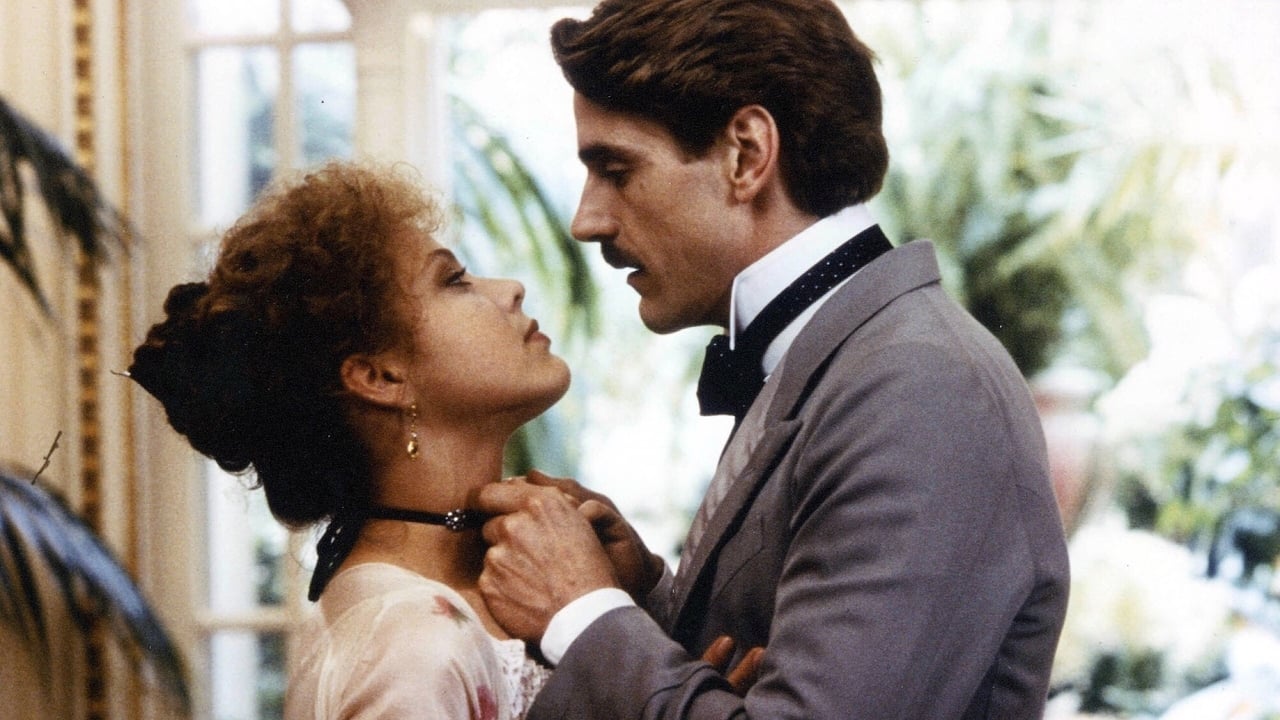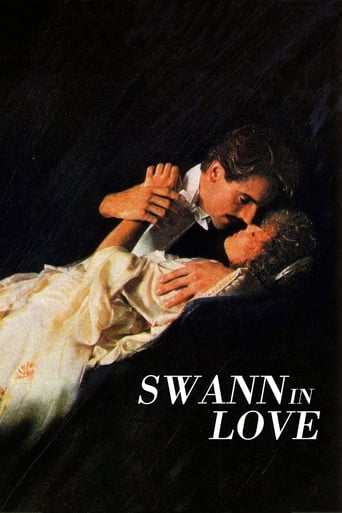

In Volker Schlondorff's Swann in Love, Jeremy Irons is Charles Swann, a cultured aristocrat who is in love with Odette de Crécy (Ornella Muti), an alluring courtesan. Much to his undying frustration, however, Odette shares her pleasures with numerous men and women, keeping the passionate Charles at arms length while continuing to take advantage of his cultural and financial largesse. Written by Peter Brook, Jean-Claude Carriere and Marie-Helene Estienne, the film is an adaptation of the second part of Swann's Way, the first book of Marcel Proust's epic seven-volume masterpiece In Search of Lost Time.Set in Paris in the 1880s, the film is a recollection by a now aged Swann of a single day in his life as he attends dinner parties and salons, mingles with the upper crust, and pursues his courtship of Odette. Though Madame Verdurin (Marie-Christine Barrault), a fixture at the gatherings, sees Swann as unworthy of Odette and has unkind words about him, he evokes sympathy from the Duchesse de Guermantes (Fanny Ardant) who appears to also have designs on him. Swann's love for Odette feels a bit obsessive when he compares her face to a Botticelli face in a painting in the Sistine Chapel, yet we may be able to recall in our own life how love can be all consuming to the point where the lover takes on attributes far beyond the reality of their true nature.Swann in Love is a valiant attempt to translate a literary masterpiece into film and is strongly supported by the cinematography of Sven Nykvist, yet it fails to capture Proust's depth of characterization, artistic imagination, or poetic sensibility, opting instead for superficial posturing, long glances, and shallow voice-overs. The highly educated and artistically sophisticated Swann, in a lifeless performance by Irons, is depicted as little more than a humorless snob who is rejected by others of his social station because of his love for Odette, but who continues to pursue her out of obsession or sheer obstinacy. In the reality of Proust, however, his love for her is so deep that he can overlook almost any flaw in her makeup, her constant lying, her lack of appreciation of art, music, and poetry, and her broad tastes in sensual pleasure.There are others ways that Schlondorff gets it wrong. Although Odette is in fact a courtesan with all that it implies, she is hardly the unintelligent tart depicted in Muti's characterization. Also, the homosexual affair of the Baron de Charlus (Alain Delon) does not become part of Proust's story until many volumes later and does not belong in the film. One would think that, at the very least, the director would utilize a late romantic work of Gabriel Fauré or Camille Saint-Saens as the model for the enchanting sonata by the fictional composer Vinteuil that brings Charles and Odette together, yet Schlondorff instead opts for the modern atonal music of Hans Werner Henze, a choice that feels totally incongruent with the place and time. With all due respect for Schlondorff's valiant attempt to translate Proust into film, Swann in Love is one effort that should have remained on the drawing board with a "someday" tag attached.
... View Morestrange construction. remarkable recreation of atmosphere, few drops of Proust novel -as discreet homage - a nice Charlus, a voluptuous Odette and correct Swann. details of a world in who mannerism is part of fall. good acting, interesting description of obsession, seductive tale about life style of aristocracy levels. and if you do not read the confession of Marcel, all is OK. but in case of error, the taste is not good. a slice of perfect universe remains a slice. the good intentions are far to be steps of adaptation. the flavor is present, the voices are at perfect place, the images are parts from the cake but result is a poor drawing. sure, it is an exercise." A la recherche de temps perdu" is out of any adaptation. but important is the fact than it is not a really disappointing film. that is the key.
... View MoreLet's face it, Proust's monumental "A la Recherche du Temps Perdu" is probably unfilmable. The Chilean director Raoul Ruiz had a commendable shot at adapting the final volume "Time Regained" in 1999 that achieved a certain measure of critical acclaim in spite of being rather diffuse with not all the characters clearly presented. ( I think you have to know the novel well to fully appreciate it). A rather more satisfying attempt appeared fifteen years before with Volker Schlondorff's "Swann in Love". By concentrating more modestly on what is really a vignette, a novella tucked within the vast structure, Schlondorf achieved a work with a real sense of cinematic concentration. There is no Marcel, whose endless reminiscences are something of a kiss of death to film narrative and no confusingly vast set of characters to get to grips with. There is simply Swann, the man about town, his obsessive pursuit of the whore, Odette, and the characters he bumps into during the course of a short space of time and a brief epilogue some years later. It is a very free adaptation. I cannot remember the Baron de Charlus appearing much at this early stage of the novel, but, as he is one of Proust's most fascinating creations, his presence is welcome, even if John Malkovich in the later version is better cast than Alain Delon. What strikes most forcibly is Schlondorff's unflinching look at a thoroughly decadent and degenerate society. In studying only the rich he paints a portrait of the lengths they are prepared to go to satisfy hedonistic pleasure and, in the case of Swann, lust. In an amazingly frank scene he sodomises a prostitute but is obviously more interested in obtaining information about Odette from her than in what he is doing. Sven Nykvist's camera glides through salons stuffed with rich objects and people: this is a world where the poor simply do not exist. All around however are flunkies whose sole purpose in life is to serve their masters uncomplainingly. Just occasionally a look, such as the coachman Remi's, when he is ordered by Swann to drive him half the night in his pursuit of Odette, says it all.
... View MoreTerrific costuming and production design, most noteworthy is the luminous camera-work of Sven Nykvist (Bergman/Allen/Tarkovsky and others). The film is paced as languidly as narrative film making will permit, allowing a certain quality of the author's voice to be felt beneath the demands of "storytelling", one of the chief obstacles in adapting this material.I think that a masterstroke in this film is the music. While it may seem inconsequential, it draws the film into a more complex direction than typical period music would have done. I believe that this allows the film to reinvent the quality of emotional space in the material.Contemporary composers of modern chamber music like Hans Werner Henze (who'd collaborated with Schlondorff before) were brought into the making of the film. The music succeeds by injecting an atonal, dissonant, aching, atmosphere into the story. The piano and violin pieces work well against typical form and aid the narrative in a superbly contemplative manner. I was reminded somewhat of "L'Année dernière à Marienbad", simply because the musical "cues" were not spelled out in simple terms.Avoiding kitsch is part of the problem when adapting an author who discusses subjects (in epic detail) which have been filmed a thousand times before - in my opinion, the music permits yet another interpretation of that subject. At first its quietly unusual, becoming a defined, twisting voice, accenting the growing dissonance Swann experiences with Odette and ultimately with society.It is a beautiful film. My only concerns were the occasionally odd voice-over work, which was a little distracting. Ornella Muti is a knockout, but her beauty seems oddly contemporary - its as if the filmmakers were trying to make the statement that voluptuousness is eternal, while beauty standards shift periodically and culturally. Irons is excellent as Swann. I would highly recommend the film.
... View More